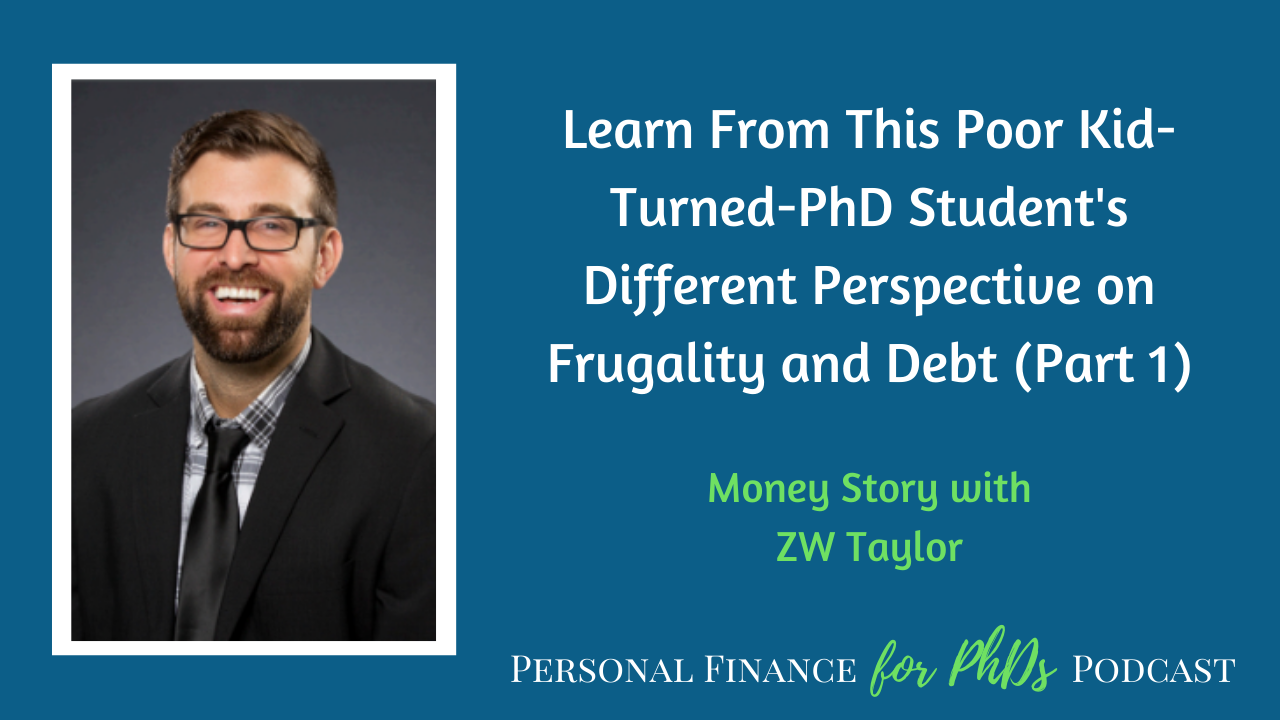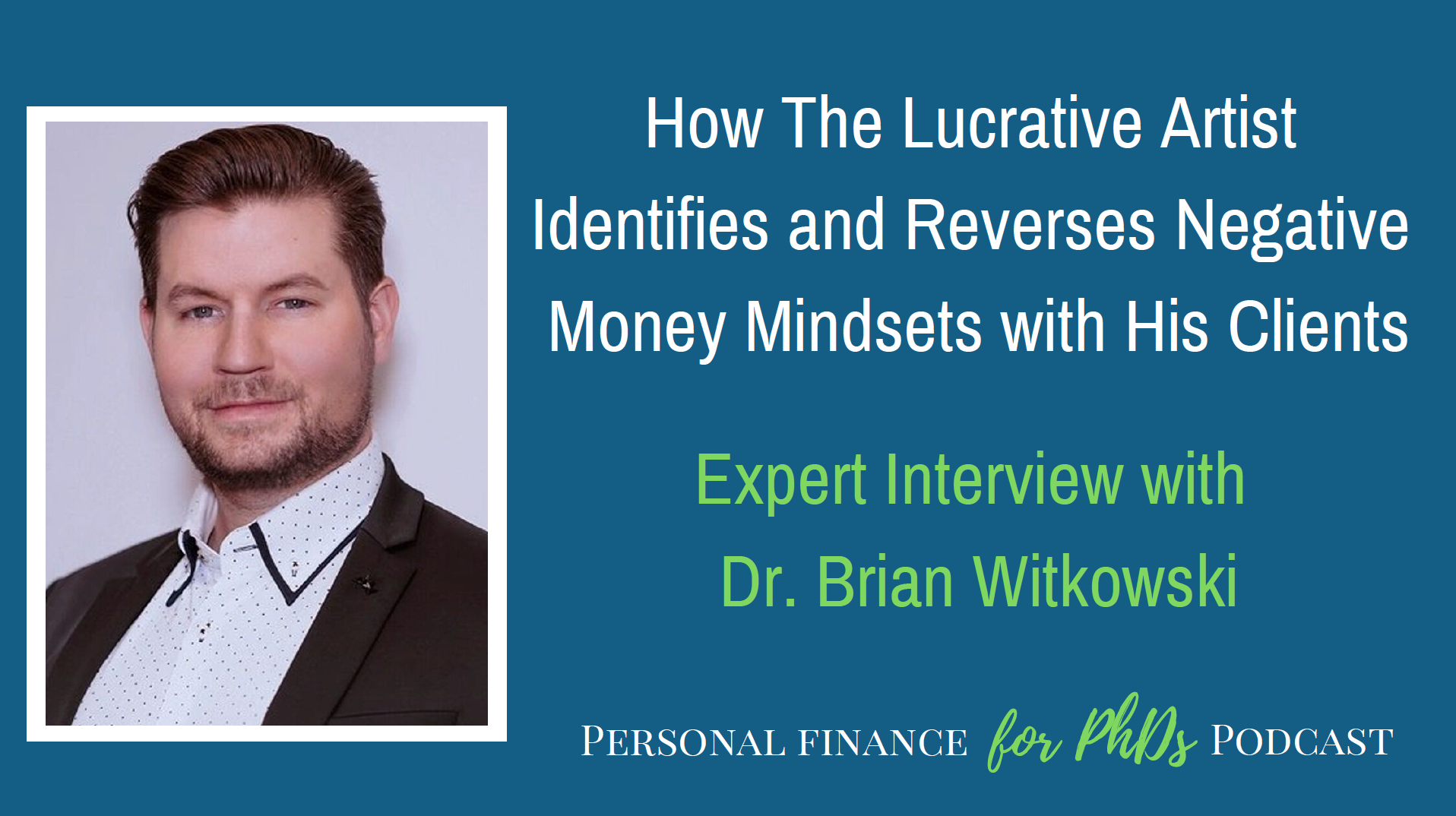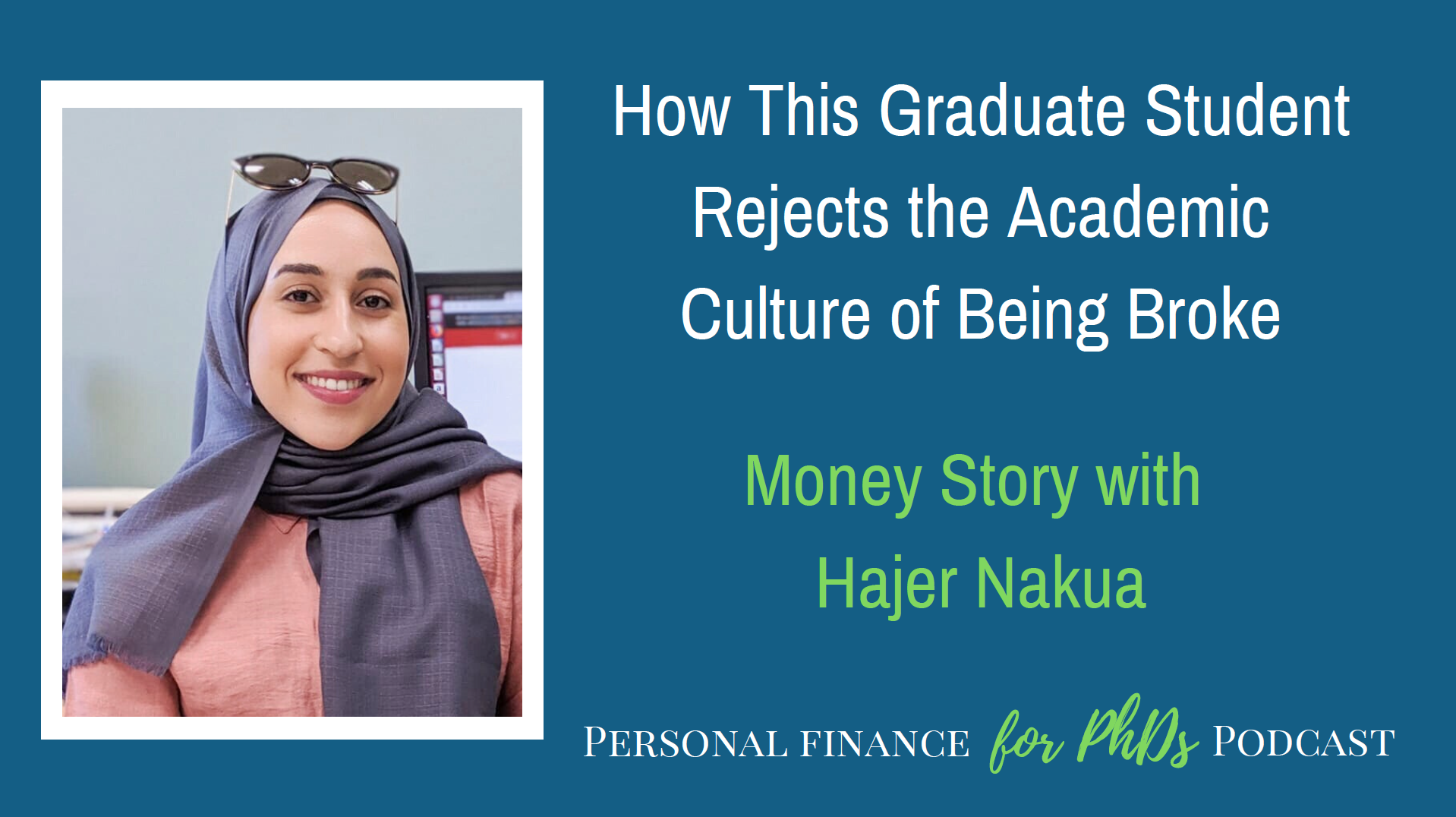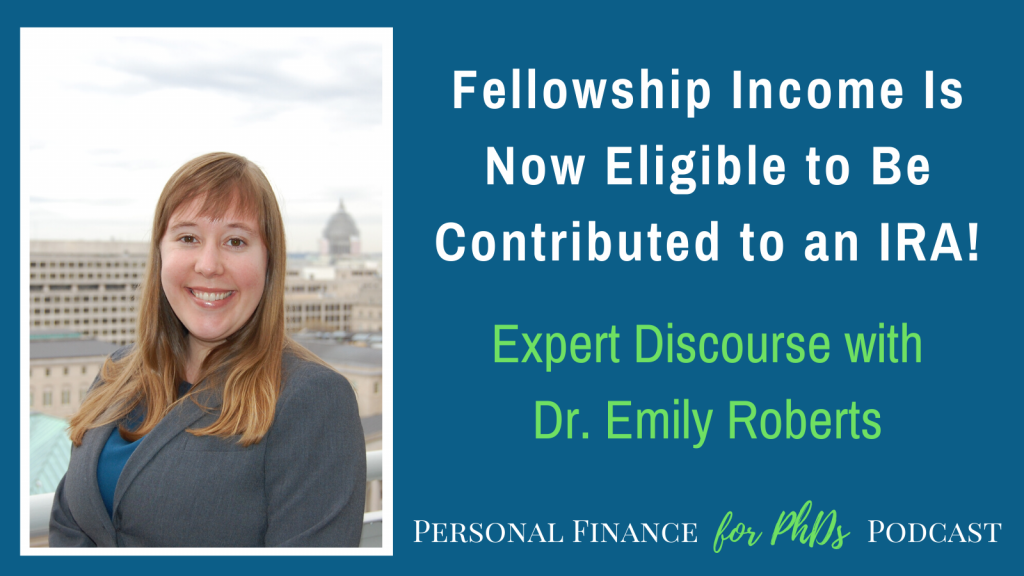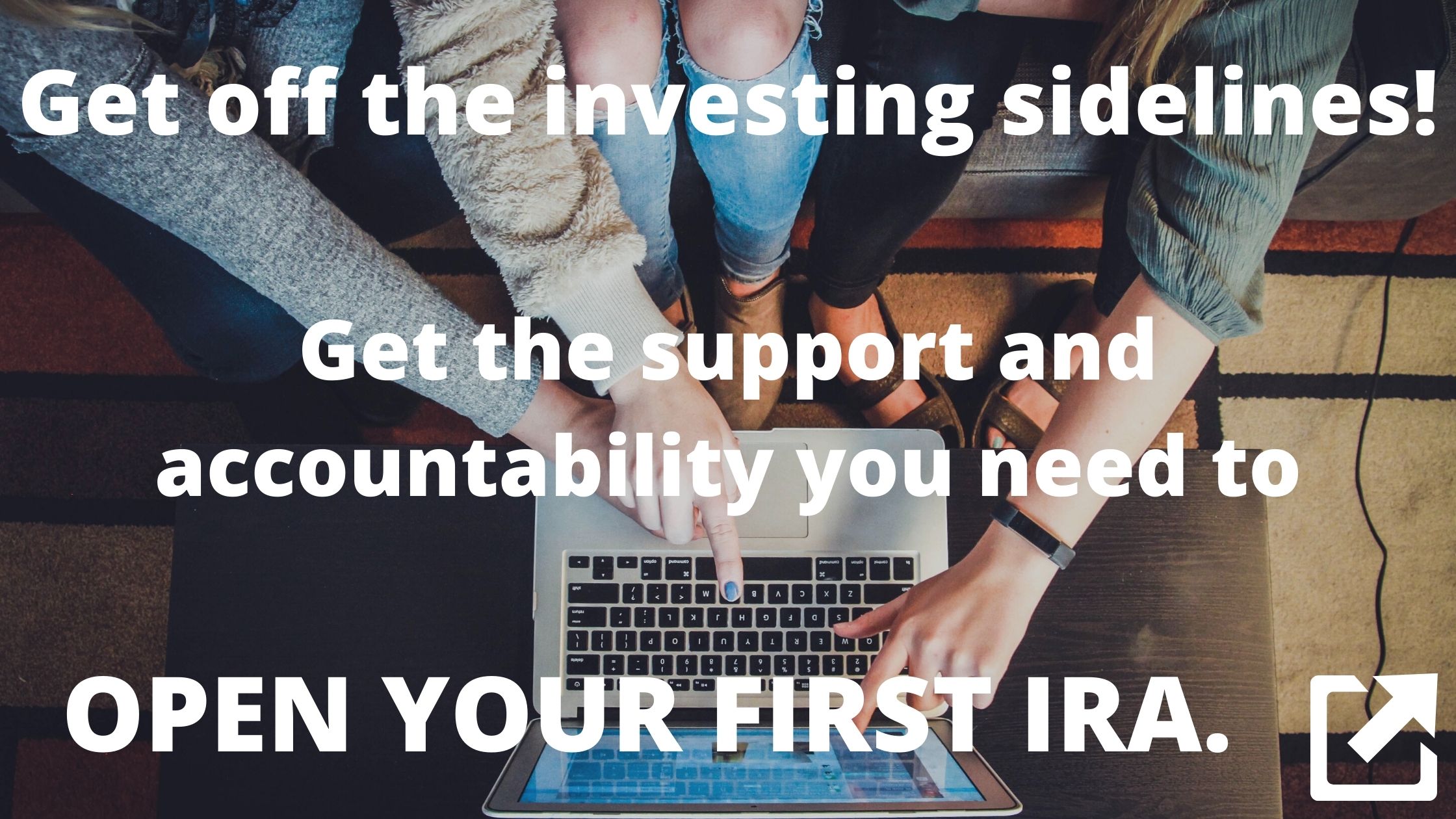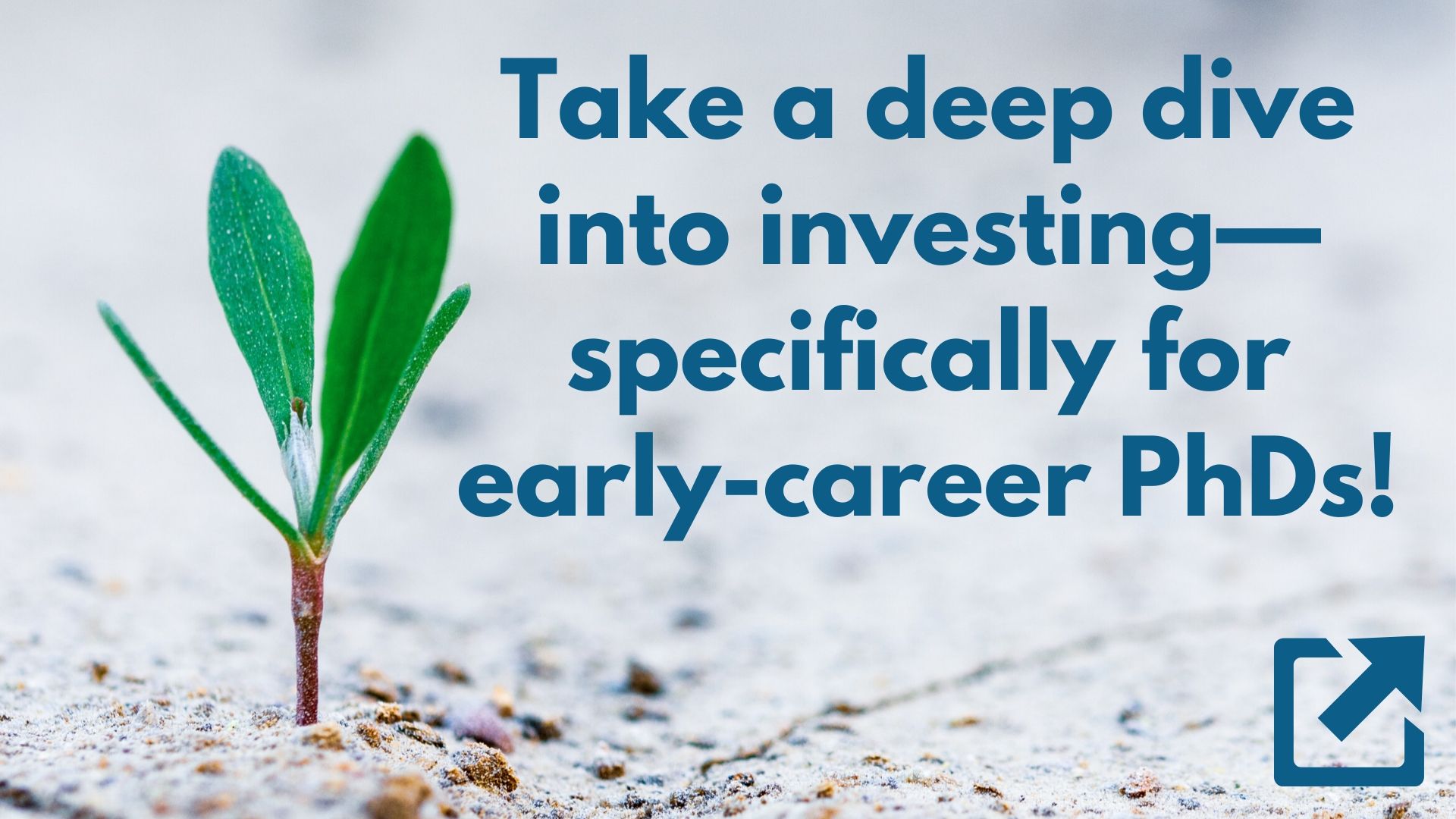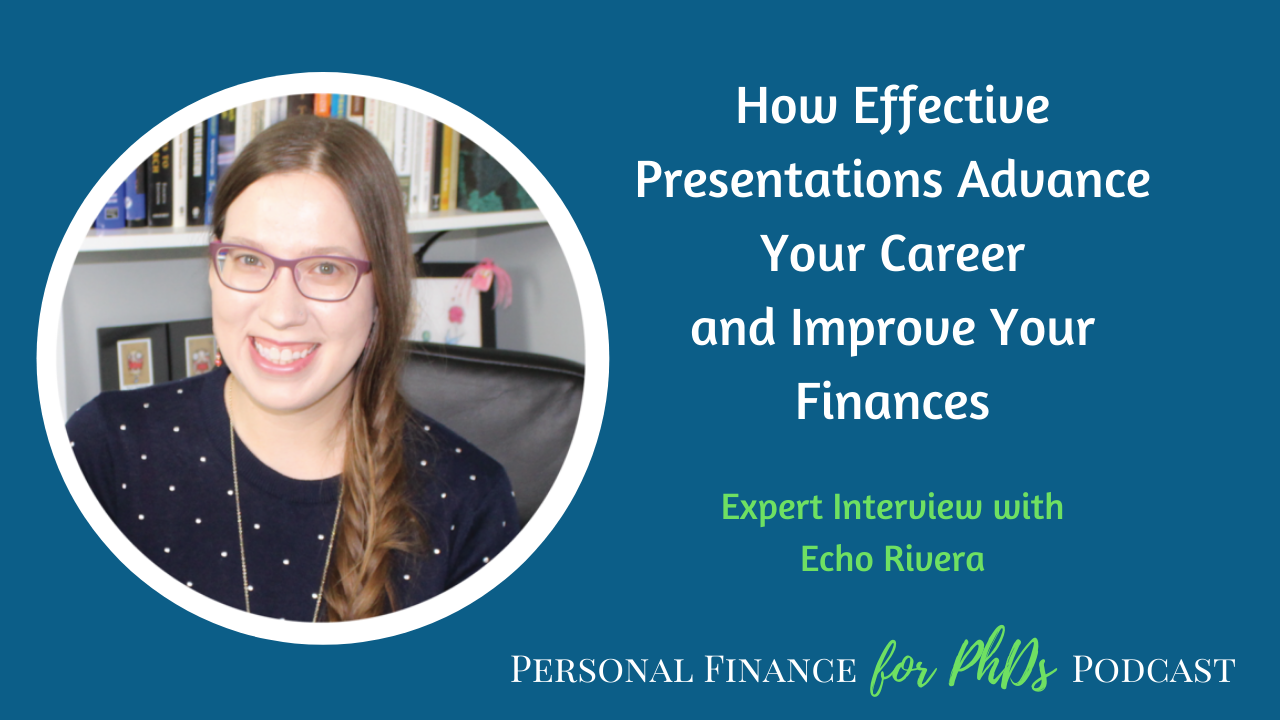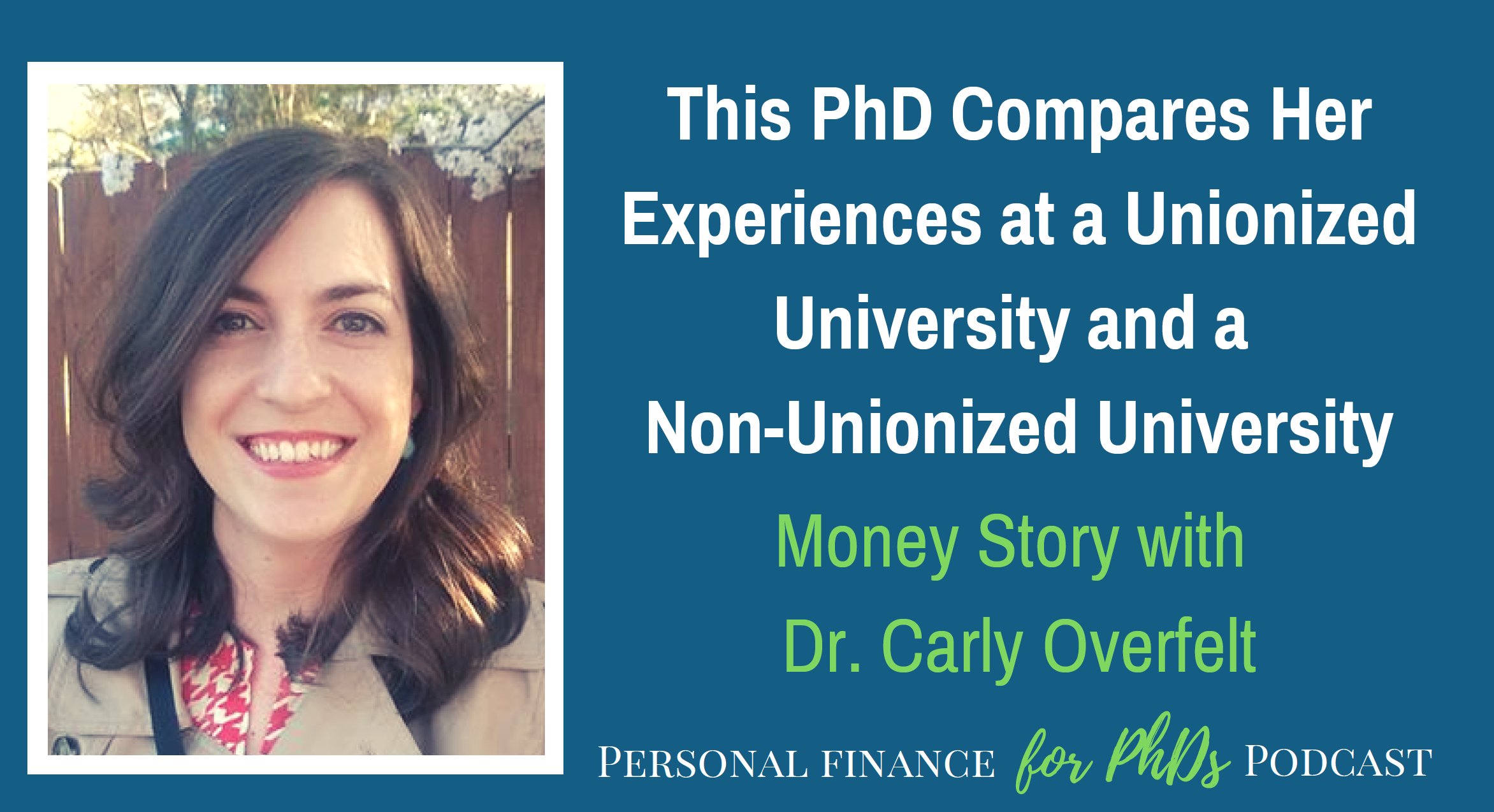In this episode, Emily interview ZW Taylor (Zach), a PhD student in Educational Leadership and Policy at the University of Texas at Austin. As a child, Zach identified as a “poor kid” and never thought higher education was for him. His upbringing and winding path through community college and his bachelor’s and master’s degrees taught him lessons about money that he has carried into his life as a PhD student – for better and for worse. In this first half of the conversation, Zach shares the financial struggles his family experienced when he was a child and how he finally committed to higher education – without debt – as a way out. Living in Austin, Texas, with its rapidly inflating cost of living, has its own challenges, and Zach still employs some extreme frugal strategies that he developed earlier in his life.
Links Mentioned in This Episode
- Part 2 of the Interview
- Find ZW Taylor on Google Scholar
- Personal Finance for PhDs: Tax Center
- Personal Finance for PhDs: Podcast Hub
- Personal Finance for PhDs: Subscribe to the mailing list
Teaser
00:00 Zach: Whenever I submit to a conference, I will email the conference chair and try to arrange some sort of email conversation or phone call and ask to volunteer in exchange registration feeds. So there are probably 25 conferences that I’ve gone to in state and out of state. I have never been turned away.
Introduction
00:25 Emily: Welcome to the Personal Finance for PhDs podcast, higher education in personal finance. I’m your host, Dr. Emily Roberts. This is season five episode ten, and today my guest is Zach Taylor, a PhD student in Educational Leadership and Policy at the University of Texas at Austin. Zach has such a unique perspective and so much wonderful advice that I’ve split our interview into two episodes, this one and next week’s. In this episode, Zach shares the financial struggles his family experienced when he was a child and how he finally committed to higher education, without debt, as a way out. Living in Austin, Texas with its rapidly inflating cost of living has its own challenges and Zach still employs some extreme frugal strategies that he developed earlier in his life. Without further ado, here’s the first part of my interview with Zach Taylor.
Will You Please Introduce Yourself Further?
01:20 Emily: I have joining me on the podcast today Zach Taylor, and this is a really special episode for me because we’re recording this in August, 2019 and Zach and I actually met at a conference just last month. We were both at the Higher Education Financial Wellness Summit and Zach was a keynote speaker. And he had just this incredibly compelling story to tell during that keynote, which he’ll tell us a shortened version of that during this podcast, of his own personal story. And then during that keynote he also talked a lot about his academic work and we’re not going to get into that so much in this interview, but rather how Zach’s upbringing and the money mindsets and lessons he learned as a child have affected how he handles his finances as a graduate student. And also some tips for other graduate students who may find themselves in a similar financial situation to Zach. Zach, I’m so happy to have you on the podcast today. Will you please introduce yourself a little bit further to the audience?
02:17 Zach: Absolutely. Thanks Emily. Zach Taylor. At this point, I’m a PhD candidate at UT Austin in Higher Education Leadership. I have done a lot of things in education. I’ve been an admissions reader, college instructor, high school English instructor, youth coordinator, mentoring program coordinator. I’ve kind o, been in education my entire life. I really appreciate the opportunity to be here and be talking about this because so many of my life lessons in living an educational life. My mom was also a teacher. It’s been constantly learning new things and ways to save money. I’m so excited to be able to share it today.
Early Childhood and Living in Poverty
02:58 Emily: Yeah. Perfect. So let’s go back to your childhood, your pre-college days and tell us what was going on with you around that time, what was going on with your family?
03:09 Zach: I grew up very low income in the Midwest. Kind of grew up all over the place. My dad had a really hard time holding a job and it came to a head when I was about seven or eight years old. I think my mom realized that she couldn’t just take care of my brother and I, she needed to work, because my dad just couldn’t do it. She became a teacher, and we lived on that teacher salary pretty much my entire adolescence until I was 13. Something kind of tragic happened in my family at that point, so my mom and I decided to leave and go make a life on our own. And if any listeners out there are children of divorce, you can know how financially crippling that is, especially on a teacher’s salary. My mom paid child support to my dad. We were very, very poor. We split a apartment together. She became kind of more than a mom to me. She was kind of my roommate and my best friend and someone who split expenses with me.
Zach: And that was happening during high school. I was an athlete in high school and I quit most all sports by junior year because I needed to work. I needed to make money. I wasn’t able to buy food and pay for transportation and feel like I could save any kind of money at all. And that mindset growing up, coming from the family, I came from — loved going to the library because the library was free. I loved riding the bus because the bus was free. It didn’t cost anything. It was always reliable. It was always there for me. And so as I was growing up, having lived with my mom and having worked really, really early on, a lot of those behaviors really carried into college. I still, to this day, I love a good library. I love a good bus ride. I love having roommates. I’ve never really lived on my own because I’m so used to splitting expenses and living as frugally as possible. I’ve kind of foregone a lot of privacy in my life for that reason. I’m happy to share a lot of those experiences, and how they’ve translated in my college life because I’m again surprised how many habits were formed when I was a young kid that actually, I still practice to this day.
Path to the PhD
05:39 Emily: Yeah, we will definitely get into that in a moment. I also wondered if you could share for the listeners a little bit of your nontraditional path to the PhD. Because there may be some people in the audience who are thinking, well, they have some degree of imposter syndrome as many people do, but maybe a higher degree than others because of not going directly to college after high school or starting in a community college like you did. So can you talk about how you got to where you are now educationally?
06:08 Zach: Yes. I was not a good high school student. Like I said, kind of a broken home, working a lot. I never wanted to go to college. I actually didn’t think about going to college until my stepdad — I was living in my mom and stepdad’s basement working at a gas station and he had said, you’re a smart kid, you can probably go to community college. I was actually not fully admitted to community college. I had to take remedial courses. I had not taken even Algebra II at high school. I didn’t even pass Geometry. I was really credit deficient. I had no AP classes. I barely graduated when I did. And part of the reason I graduated was because my mom was a teacher and kind of helped me out doing summer school and getting and making up credits. I was extremely credit deficient coming in. Took the remedial coursework at my community college the first semester. I joked during the keynote that tuition at the time was $150 per class, but to me that was like food for months. That seemed so unaffordable. $150 per class was unaffordable to me and was initially a deterrent.
07:21 Zach: But I slowly came to realize that education was a way out of working at that gas station and being a poor kid. It was a a way out in many ways. I eventually finished about 18 credits or 21 credits at the community college. Got some really good academic momentum going. I applied to the cheapest in state public school that I could. I wasn’t looking at academic programs, wasn’t looking at what I was going to do. I solely looked at the tuition rates and I said, what can I afford to do as a part time student working part time so I don’t take out any loans? I was very debt averse and one of those things from childhood was if you couldn’t pay for it in cash, you didn’t buy it. And the same attitude translated to college. If I could not pay for tuition in cash, if I could not afford to support myself, I was not going to go. There were a couple of times then throughout undergrad where I stopped out and took a semester off and saved money and came back the next semester. I remember professors telling me, I hope I see you in the spring because they knew I wasn’t going to be there in the fall because I was going to take a a gap semester and make some money.
08:44 Zach: After seven years, I eventually finished. I transferred a few times trying to save money. My parents lost a lot of money in the housing collapse in 2008 so I ended up stopping out again and going back to work. But I was very persistent and also, another lesson from childhood was no waste. Don’t waste anything. And I had already had 80 or 90 credits. I didn’t want to waste those. I wanted to finish. So that was something that really propelled me forward was this investment. I already knew how many sacrifices, how much money, how much time I had already put into this thing, and I really wanted to finish.
09:24 Zach: I eventually did finish. Got a job as a mentoring program coordinator and teacher. I paid for master’s degrees with cash. I didn’t take out any debt. Granted, it took me five years to earn those degrees, but I didn’t accrue any debt because I paid as I was being paid. I was never able to save any money. To this day I have not had a savings account over a thousand dollars. however, I don’t have any debt. I don’t have any credit card debt. I don’t have any college student loan debt, specifically because I paid as I went. Now, that is not going to sound like how a lot of students do it. A lot of students go right from high school to college. They take off those loans, they get that degree as soon as they can. I took a much different path, but in looking back on it and hearing some of the stories that I hear from some classmates, some of them are a little envious of how I did it. And granted there were lots of sacrifices along the way, but being 33 years old, being in a really great PhD program, almost to the finish line and not having any debt is something I’m really proud of.
10:37 Emily: It’s a truly incredible story. And I hope that anybody who can relate to your path in any way, either about growing up as you said, as a poor kid and having some of the mindsets that come with that, or taking this sort of longer term route to get to the PhD to get to where you are now. But by the way, being 33 and being almost done with your PhD doesn’t sound too far behind to me. I hope that they’ll be able to follow up with you if they have anything that they want to you know, talk with you further about or learn from you about.
Carrying Forward Financial from Growing Up Poor
11:08 Emily: What I wanted to ask you about now is some of the attitudes or mindsets that you have carried from your childhood that are, that you’re carrying forward. Whether they are mindsets that you think help you or whether there are mindsets that you think kind of hurt you. You’ve already mentioned a couple of them. One is you being extremely frugal. We’ll get into more of that in a few minutes. Being extremely frugal, not wanting to waste anything. The other one is debt aversion, which I learned at this conference that we both attended is a very common thing for people who grow up in lower income families is having debt aversion, which can be very helpful in some situations and can also, as you were just saying mean that it takes you more time to do certain things like finish your education. If you’re not taking out student loans, there are just trade offs. Are there any other mindsets that you can see from your childhood that are carrying over?
11:58 Zach: I’ll start with the positives. Having the work experience and the education has been so helpful in interpersonal communication and just professionalism. I waited tables and I stocked shelves at gas stations and grocery stores and that kind of manual labor. And working with other people, working your body, you’re really just kind of come to an understanding that there are a lot of different kinds of work out there, about the different kinds of people out there, and to respect all professions and be able to communicate with folks from lots of different professions. In a positive, feeling like I needed to avoid that debt and work my entire way through, I’ve got to meet a lot of people I would never get to meet. I’ve got to develop my communication skills to a degree where I feel as comfortable on a public bus or a shelter or a church or a tier one research institution. Talking with senior level administrators, same level of comfort because I’ve been around and lived amongst all those kinds of folks. So that has really, really helped me in terms of the negatives.
13:13 Zach: Growing up, never went out to eat, never vacationed. The longest vacation we actually ever took was a weekend trip to Minneapolis when I was, I think eight or nine years old and that was it. That was the only vacation. Never left my home town. My first plane ride was at age 30, coming and visiting UT Austin. We never took vacations, kind of with the idea that if you can’t pay for it in cash you are not going to pay for it. And then thrifting almost everything. In prepping for this podcast, I was trying to remember going school shopping and I don’t think I ever did. I don’t think we ever went school clothes shopping. It was either hand me downs from older kids in our neighborhood and cousins or it was going to St. Vincent DePaul and getting used clothes. And to this day when I need something, a chair, shorts, shoes — I just bought a really great pair of used shoes — I still go thrifting for a ton of stuff. That has stuck with me, for better or for worse. To this day, I also just seek out free stuff even if I don’t feel like I belong, like free food on campus. There are speaking events that I go to that if they fit in my schedule, I’ll go for the food and for the socializing, which is totally free sponsored by the university. Also though, with having a really kind of frugal mindset, I had still made some really bad choices. I still tend to eat spoiled food and expired food. It’s just a bad habit to break. It’s kind of the no waste. I buy in bulk as much as I can and then if it goes bad, I still eat it. I still, for better or worse, shop at Walmart. A lot of my classmates are hard on me for shopping at Walmart, but it was the only grocery store in my hometown. It is consistently the cheapest. They always have discounted poultry and meat and bakery. I always freeze things and can things when I can. Some people have thought that I’m kind of weird for doing that. Like buying day old bread and buying day old meat and freezing expired food to kind of stretch the eatability and the usability of the food.
15:42 Zach: That has actually been a little socially stigmatizing. I find myself kind of gravitating toward other folks who grew up poor and just understood that that loaf of bread should last you a week and a jar of peanut butter should last you two weeks. And those can be meals, every single meal if you need them to be. It’s also been a little stigmatizing being an Austin because there’s so much money in this town. There’s so much technology and a lot of folks do come from money and going out to eat twice a week. Living downtown in a $2,500 a month apartment isn’t anything out of the ordinary. It’s so foreign to me and it’s been hard to relate to some folks who grew up that way, especially if we’re in the same PhD program, because I just don’t have those experiences. I don’t feel good about doing those things. So there are some positives than, as you said, there’s obviously some negatives too.
16:43 Emily: Yeah. I’m so glad that you’re telling this story here. It’s really good for me to get your perspective because I did grow up very differently, and most people who I know grew up more middle-class like I did. Or maybe if they had a background more similar to yours, maybe they were sort of concealing that. It sounds like you don’t do that, at least not all the time.
Commercial
17:12 Emily: Emily here for a brief interlude. Tax season is upon us and while no one loves this time of year, it’s particularly difficult for post-bac fellows, funded grad students, and postdoc fellows. Even professional tax preparers are often thrown for a loop by our unique tax situation. And don’t get me started on tax software. I provide tons of support at this time of year for PhD trainees preparing their tax returns. From free articles and videos, to paid at-your-own-pace workshops, to live seminars and webinars for universities and research institutes. The best place to go to check out all of this material is pfforphds.com/tax that’s P F F O R P H D dot com slash T A X. Don’t struggle through tax season on your own. Visit my website for the exact information you need in the most efficient form available. Now back to the interview.
Finances During Grad School
18:16 Emily: Okay. My question is around sort of the PhD program being kind of an equalizer in terms of income. Not that every PhD student or every PhD student at UT Austin makes the same amount of money, but more that you know, you’re kind of put on, let’s say within a factor of two, within your university, of one another. Now, some people coming into that situation are used to living a lifestyle that is higher than what they can afford on their PhD stipends. You, maybe, I don’t know, we’ll get into it, this may be have been a lifestyle increase to be able to have the stipend that you have, based on where you were coming from before that. But everyone has a choice to make when they hear the stipend that they’re receiving. They can choose to live within their means, at least semester by semester, sometimes funding changes, but they can choose to attempt to live within their means. Or they can choose to take on outside work or take out student loans perhaps and augment that stipend income with other sources of income or debt. I was wondering, maybe you could speak a little bit about what your finances are like right now — what is the stipend that you get at UT Austin and how did that compare is really briefly to cost of living? And whether or not you’re able to save on that or does anybody save on that?
19:35 Zach: In the college of education and most social sciences, the typical graduate research assistant or assistantship stipend is between $1,400 and $1,700 a month.
19:46 Emily: Not generous.
19:48 Zach: Not generous. And if you look around Austin, the typical one bedroom, entry-level, we’re talking no amenities, no garage, you might not have central air conditioning, you may have a box air conditioner, $1,500 a month, $1,700 a month, and if you want to live downtown and not have a car, it’s going to double and sometimes triple. It’s pretty ridiculous. The living stipend does not let you live comfortably whatsoever. And even really for my standard of living, you know, trying to find a one bedroom apartment on $1,500 a month, it’s incredibly hard to do and so incredible that I have had roommates my entire time here because there is no way that it would have been able to work. And in talking with other grad students in my program and, and in social work, and in psychology, sociology, linguistics, I don’t know anyone who lives on their own. They either live with family or they have roommates. Really in Austin there’s no other way to do it.
20:56 Zach: In terms of saving, there has been no saving. It has been avoiding debt. I’ve not had to take out any debt, but I’ve also not been able to save anything. And that’s common almost across the board. It’s just kind of four or five years of “I’m going to sacrifice earnings. I’m going to do my best to say at a debt, but I know I’m not going to save anything on the stipend”. Now at UT Austin, we do have healthcare paid for, so that is really great. It’s a great healthcare system. It’s really has really great coverage. There are other student benefits. We get to ride the bus for free. We get discounted food on campus. I mean there are lots of other perks of being a student. You are paid in other ways than just monetarily, but that money does not stretch far, that is for sure. In terms of being able to make ends meet and making enough money to be able to afford this town, I’ve picked up several other jobs, so I do work more than my assistantship for sure. I generally put in between 60 and 70 hour weeks. I also am an admissions reader. I teach courses part time at a nearby university. I edit dissertations part-time for about $75 an hour. And that has helped me make rent and pay for food some months. I also take automated surveys on Amazon Mechanical Turk during my bus rides. I’m a little bit car sick, so I can’t read a book and I can’t study, but I can be on my phone and take surveys. And through Amazon Mechanical Turk I can usually make $8 or $10 per commute, so I will drive my car to my park and ride for about 15 minutes. I’ll have about a 45 minute bus ride in, but in those 45 minutes I can make between $8 or $10 and that could be my food for a couple of days. I’ve been able to really stretch that out, but as you kind of alluded to debt aversion, but no savings whatsoever.
22:58 Emily: Yeah. Well I’d like to get now into more how you make it work. You mentioned what the stipend is at UT Austin, which I mean Austin is a rapidly increasing cost of living city, so I think what’s common in those cities is that the stipends that graduate students are paid and probably other people, the university, their salaries are not indexed at all to what the cost of living is increasing by. It’s a really tough situation to be in, especially as a graduate student, as you mentioned. Coming in and having maybe a five plus year path to the PhD, I mean in that five years, the cost of living can go up tens of percentage points, but your stipend is going to increase very little. So the situation that you sign on dotted line for when you start graduate school is not necessarily the situation that you’re in by the time you finish because your stipend is not going to be keeping up with cost of living. Just a word of warning there for prospective graduate students.
Frugal Strategies as a PhD
23:55 Emily: Now I would really love to talk about how how you make those ends meet. What are the frugal strategies? You mentioned extra income, which is fantastic, but on the side of being frugal, what are the strategies that you’re using that maybe you carried over from these mindsets from your childhood that you think are a little bit unusual? We already mentioned roommates. Okay. A lot of people have roommates. It’s kind of a necessity in most places. What are some other things that you’re doing that maybe other students wouldn’t think of? The idea behind this question is just so they can get some more ideas for other ways that they might be able to cut expenses. And also, with each tip or some of the tips, maybe say what you’re sacrificing to do things that way because there is always a trade off.
24:36 Zach: Absolutely. So, when I looked at moving here, I first and foremost looked at where the fastest public transportation was located and on which streets. In Austin, the big buses run on Congress and Lamar, so I knew I wanted to live off of those streets because I also understood that transportation was free with my student ID. First and foremost, before I even moved here, it was a very strategic move of I need to live on public transport and I also need to live near a grocery store because Austin is kind of known for having these food deserts and other major cities do as well, where there might be an entire swaths of the city where there is not a grocery store within walking distance or on public transport. Before I moved it was getting on transportation and getting on food and specifically living near a Walmart because I knew how much money I could save. Just being kind of a Walmart shopper, already having my budget from where I was moving from, I knew roughly how much I would spend so I could really budget my money really well.
25:48 Emily: With the first part, I just want to add that the selection, the location where you live determines so much about what you’re going to be spending during graduate school. You obviously are more highly aware, maybe then most students coming into graduate school. I really think this is something that other, you know, example that other people should follow.
26:05 Zach: And to your point about sacrifices, I do not live where the bars are or where the entertainment district is. I live miles and miles away from that. Right now, if I wanted to get to some place that had the live music venue, it’s a 12 mile bus ride. I do not live where all the action is in Austin and that’s a sacrifice. I lived on the bus line, I reserve myself to a 45 minute, one hour bus ride that was free. So those are are part of the tradeoffs. But I also went a step further specifically with Walmart and some thrift stores. And I asked, first of all, I would call the location and say to Walmart, when do you discount bakery? When do you discount meat? What day of the week do you put that out? And they’re happy to tell you like bakery and my Walmart is Mondays and the meat is Thursdays. So I know that I go Thursday morning, try to do grocery shopping on Monday and save a ton of money that way. And we’re talking, you know, ground beef that might be $12 is down to $4 and it’s the same amount of meat and you can still freeze it. So stuff like that.
27:14 Zach: Also thrift stores — when do you inventory and when do you give things away? A lot of folks who don’t shop at thrift stores don’t know that thrift stores throw out about 25% of the things that they get in donations and they tend to save those. So they’ll load everything in the back, they’ll sort through what is salable and then they’ll actually throw away everything that they don’t think is salable. A lot of good stuff is still in there though, so you ask thrift stores, down here it’s Goodwill. There’s lots of Goodwills and they are different in different places, but they’ll tell you when they’re going to chuck stuff and you can go on that day and not pay anything. You can go through and get good chairs, good tables. And especially in grad school, if you’re only going to be in a place for four to five years, a lot of that furniture can be just a rental, a four year rental. You go get a free set of kitchen table and chairs for free from a Goodwill, use them for a couple of years, and then give them away. Going the extra mile, especially knowing where I was going to live, but then the social services I was going to use — how could I maximize those? So that when I got here, it wasn’t a huge culture shock. I was doing a lot of same things back home that I had been doing here.
28:29 Emily: Yeah, I really love that combo, those first two tips of it’s not only where you shop, but when you shop. And I don’t think that second step when you shop is something that necessarily occurs to people right away. Thank you for that insight. What’s another tip that you have?
28:47 Zach: this is more along the academic side. in being a PhD student, there’s always pressure to publish and go to conferences and be an academic. But I have found that I am able to save quite a bit of money and do a lot of travel that I would never be able to do by one, when I do go to conferences, be extremely outgoing and friendly and —
29:11 Emily: I can attest to this, you are extremely outgoing and friendly. Yes.
29:14 Zach: And specifically try to meet people that are not from your state and those people become your friend network and those become people who have couches and floors that you can sleep on. So I have gone to a ton of conferences and not paid for a hotel or an Airbnb at all, just knowing someone in that spot. I’m going to Portland in the fall. I’m staying with someone. I’m going to San Francisco next spring. In San Francisco, the group hotel rates were $190 per night. I’m staying for free with a friend who I met at a conference and I have them return that favor. People who are coming to conferences in Austin, I always put them up, I keep a spare mattress, we throw it in the living room and they sleep on a mattress in the living room floor. That’s saving them hundreds and hundreds of dollars of conference hotels.
30:08 Zach: And then actually attending the conferences — I heard a lot of folks tell me they could never do this, but whenever I submit to a conference I will email the conference chair and try to arrange some sort of email conversation or phone call and ask to volunteer in exchange registration fees. So there are probably 25 conferences that I’ve gone to in state and out of state where I know when I will arrive and I’ll say, I can give you eight hours of my time before my presentation. I’ll help you at 5:00 AM and I’ll get the conference room set up. I’ll set up tables, I’ll put up projectors. TACAC is the admissions conference here in Texas and I have done check-in for the past three years in exchange for registration. I will happily volunteer a few hours of labor for a $200 registration fee that I don’t have to pay. And it also doubles as great networking, because they see a grad student who is eager to volunteer and help out and chip in, and I have never been turned away. I’ve never had anyone say, “no, we can’t support you in some way.” It’s not only saving the money in your personal everyday life, but in your academic life, there’s also some ways you can save some serious money and that money adds up over time. I’ve saved at this point over three years, thousands of dollars by doing those things.
31:34 Emily: Yeah, that’s a really incredible and powerful tip that I’m so glad you shared because I hear all the time, um, about how conference expenses are such a limiting factor in a grad student’s ability to network, ability to get their research out there and so forth and those fees and so forth are real barrier. Even if your department or your funding agency or whoever pays for part or all of it, it still is hard to have that money up front and what you’ve come to here is just a really brilliant solution, and I hope that a lot more people will start following your example. I mean the fact that you’ve never been turned down like when given that offer is just incredible. Well, I hope not too many people start doing it or else maybe you’ll have some competition for the volunteer jobs, but it’s a great, great idea and such an actual tip. Thank you.
Outtro
32:25 Emily: Listeners, thank you for joining me for this episode. PFforPphDs.com/podcast is the hub for the Personal Finance for PhDs podcast. There, you can find links to all the episode show notes and a form to volunteer to be interviewed. I’d love for you to check it out and get more involved. If you’ve been enjoying the podcast, here are four ways you can help it grow. One, subscribe to the podcast and rate and review it on Apple podcast, Stitcher, or whatever platform you use. Two, share an episode you found particularly valuable on social media or with your PhD peers. Three, recommend me as a speaker to your university or association. My seminars covered the personal finance topics PhDs are most interested in, like investing, debt repayment, and taxes. Four, subscribe to my mailing list at PFforPhDs.com/subscribe. Through that list, you’ll keep up with all the new content and special opportunities for Personal Finance for PhDs. See you in the next episode, and remember, you don’t have to have a PhD to succeed with personal finance, but it helps. The music is Stages of Awakening by Podington Bear from the Free Music Archive and is shared under CC by NC. Podcast editing and show notes creation by Lourdes Bobbio.
